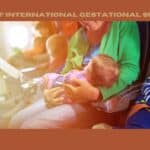After seeing me on ABC’s Nightline, Julia emailed me to share her experience of being a surrogate.
Jennifer: How did you come to make the decision to be a surrogate?
Julia: At the time, my boyfriend’s brother and his wife were unable to conceive. They were talking about how expensive it was to adopt a baby, and I asked them if I could be a surrogate for them so they could have a baby. They accepted my offer and I was a gestational surrogate for them.
Jennifer: What happened next?
Julia: The couple found a fertility doctor to use and I went through all the screening to become a surrogate. The screening included a mental health exam to be sure I was mentally healthy to serve as a surrogate.
Jennifer: Did you sign a contract?
Julia: We had a legal contract drawn up which included language about my being compensated for lost wages in the event I was unable to work during the pregnancy. I was not in a financial position to lose income as I’m a single mother.
Jennifer: Did the assisted reproductive cycle work?
Julia: Yes, four embryos were produced and two were implanted but one resulted in a pregnancy. I got pregnant in September of 2013 and vaginally delivered a healthy baby in May of 2014.
Jennifer: How did the pregnancy go for you?
Julia: I had to take hormone shots for about 8 weeks at the beginning of the pregnancy. I did feel like the fertility doctor was more concerned with the baby and not me. The baby was her priority, not my health. In November of 2013, I was hit hard with depression after the hormone shots ended. I was unable to work for 5 weeks. I was being treated by the intended mother’s physician, which I feel was a conflict of interest. The doctor told me my depression was not related to the pregnancy or the hormone shots, which meant I was not able to get paid time off from my stressful job working at a call center. The intended parents were really absent for me during this time. They were not talking with me and they were not involved with the pregnancy. This caused my depression to worsen to the point that I was suicidal and had to be admitted to a psychiatric ward for four days. I refused to take anti-depressant medications for fear they might harm the baby and the intended parents would refuse to take the baby then.
Jennifer: If you were missing work and were hospitalized, were you receiving compensation from the intended parents per your contract?
Julia: My employer wasn’t compensating me for lost wages for time away from my job. The intended parents were not paying me either since they said my health problems were not related to pregnancy, so I had to get another lawyer since the intended parents were trying to back out of their deal.
Jennifer: So, you have no income, you are a single mother, and now you have to hire an attorney to get the money you should have been paid per your contract?
Julia: Yes, and when I finally began to get paid, I would receive a money order in the amount of about $302 a week, which was what my weekly wages would be less my tax liability for my salary. I did lose my job too, so I was able to collect unemployment. Then the intended parents decreased the money they were paying me to $95 a week to make up the difference between my unemployment and the previous $302 a week. These payments were made to me from January until the baby was born in May. Then for six weeks after the birth, I received the $302 a week payment.
Jennifer: What is your relationship now with the intended parents and the baby?
Julia: Currently, I have no relationship with the intended parents and I am not allowed to see the baby. The intended parents also split up right after the baby was born and the intended father has custody of the baby.
Jennifer: So is it safe for me to assume you are not a supporter of surrogacy?
Julia: Yes, that is why I contacted you and spoke with you, to tell others about my experience.
Author Profile

- Jennifer Lahl, MA, BSN, RN, is founder and president of The Center for Bioethics and Culture Network. Lahl couples her 25 years of experience as a pediatric critical care nurse, a hospital administrator, and a senior-level nursing manager with a deep passion to speak for those who have no voice. Lahl’s writings have appeared in various publications including Cambridge University Press, the San Francisco Chronicle, the Dallas Morning News, and the American Journal of Bioethics. As a field expert, she is routinely interviewed on radio and television including ABC, CBS, PBS, and NPR. She is also called upon to speak alongside lawmakers and members of the scientific community, even being invited to speak to members of the European Parliament in Brussels to address issues of egg trafficking; she has three times addressed the United Nations during the Commission on the Status of Women on egg and womb trafficking.
Latest entries
 infertilityApril 23, 2024The Rise of International Gestational Surrogacy in the U.S.
infertilityApril 23, 2024The Rise of International Gestational Surrogacy in the U.S. Assisted Reproductive TechnologyApril 16, 2024Founder Jennifer Lahl’s Speech on Surrogacy to the Casablanca Declaration
Assisted Reproductive TechnologyApril 16, 2024Founder Jennifer Lahl’s Speech on Surrogacy to the Casablanca Declaration #BigFertilityFebruary 27, 2024No, Alabama Didn’t Ban IVF
#BigFertilityFebruary 27, 2024No, Alabama Didn’t Ban IVF ArticleSeptember 25, 2023The Little Engine That Could
ArticleSeptember 25, 2023The Little Engine That Could

